Canada
Canada: NDP breakthrough in Quebec -- a challenge for the Canadian left

New Democratic Party leader Jack Layton.
By Richard Fidler
May 8, 2011 -- Life on the Left -- If New Democratic Party leader Jack Layton’s election-night speech to his Toronto supporters is an indication of what lies ahead, the NDP is going to have a hard time coming to terms with a parliamentary caucus now composed of a majority of MPs from Quebec.
To a crowded room in which nearly everyone was waving Canadian flags, the NDP leader delivered two-thirds of his remarks in English without ever mentioning the expression “Quebec nation”. The scene, televised across Canada, did not go unremarked in Quebec, where most of the NDP’s sudden support had come from nationalist-minded voters, including many sympathisers of Quebec independence.
Montreal conference rallies support for rights of nature

By John Riddell
April 23, 2011 – Links International Journal of Socialist Renewal -- Bolivia marked Earth Day (April 22) this year by formulating the Law of Mother Earth, which—when adopted—will establish 11 new rights for nature, including the right not to be polluted and the right to continue vital cycles free from human interference.
On April 20, the United Nations General Assembly debated a proposal introduced by Bolivia, with support of other South American countries, to adopt a Universal Declaration of the Rights of Nature. The proposed global treaty says that “Mother Earth has the right to exist, persist, and to continue the vital cycles … that sustain all human beings”.
Meanwhile, Canada’s political and media establishment have organised an election campaign in which the world’s ecological crisis is barely mentioned.
‘Beyond capitalism’? Québec solidaire launches debate on its program for social transformation

Françoise David, QS president, and Amir Khadir, its sole elected member of the National Assembly.
Canada: How can we aid Libya’s freedom movement?
Libyan Canadian shouts down with Gaddafi slogans outside Calgary City Hall, February 22, 2011. Photo by Ted Rhodes, Calgary Herald.
By John Riddell
February 28, 2011 -- Socialist Voice -- The brutal massacres of civilians in Libya at the order of the country’s dictator, Muammar Qaddafi, have shocked the world. His air force has carried out air strikes against unarmed civilians. On February 25, Qaddafi followers aimed murderous fire on anti-government protests in his last stronghold, Tripoli. The government declares its intention of reconquering the country in civil war.
What can those in Canada do to end the killings?
On February 26, the United Nations Security Council voted for sanctions against the Libyan regime, including an arms embargo and the freezing of assets of Qaddafi and his family. These measures are hardly more than cosmetic, serving to polish up great-power credentials.
Why does health care in Cuba cost 96% less than in the US?

Claudia Lopez, an intern, with outpatients at 5 de Septiembre Polyclinic, Havana.
Haiti: `Don't blame Haitians for election fiasco'

The popular Fanmi Lavalas party was excluded from the November 28 Haitian elections.
The following article appeared on the op-ed page of the Toronto Star, Canada’s largest circulation daily newspaper, on December 1, 2010. Kevin Edmonds is a freelance journalist and graduate student at McMaster University’s Globalization Institute. Roger Annis is a coordinator of the Canada Haiti Action Network.
* * *
By Roger Annis and Kevin Edmonds
December 1, 2010 -- Those who counselled against holding a national election in Haiti in the midst of a catastrophic humanitarian crisis will take no comfort in the debacle it became. Our thoughts rest squarely with the tens of thousands of people afflicted with cholera, and the hundreds of thousands of earthquake victims still without shelter, clean water and hope. How much suffering could have been alleviated with the tens of million of dollars spent on a wasted electoral exercise?
Haiti: Sham `selection' serves interests of wealthy elite and foreign powers
By the Canada Haiti Action Network
November 12, 2010 -- The Canada Haiti Action Network (CHAN) is once again expressing its grave concerns about exclusionary elections in Haiti.[1] It joins with the many Haitians as well as human rights organisations in Haiti and abroad in condemning these elections as serving the interests of Haiti's wealthy elite and the foreign powers that have dominated Haiti's past and present.
Ecuador, Venezuela: Danger south of the border

Supporters of Ecuador's President Rafael Correa celebrate his return following defeat of the attempted coup.
Afghanistan: Malalai Joya -- `for our people, Obama is a warmonger, like another Bush'

Malalai Joya visits a girls' school in Farah province in Afghanistan. Photo: AfghanKabul.
By Malalai Joya
October 10, 2010 -- rabble.ca -- In the United States, many looked to the ballot box and hoped for real change when Barack Obama was elected president in 2008.
To be honest, I never expected that he would be any different for Afghanistan than President George W. Bush. The truth is that Obama's war policies have turned out to be even more of a nightmare than most people expected. Obama talked a lot about hope and change, but for Afghanistan the only change has been for the worse.
After almost two years of Obama, the number of US troops occupying Afghanistan has more than doubled. And the number of drone attacks in Pakistan has increased. Obama's so-called surge of troops has resulted in increased Afghan civilian deaths.
The documents released by Wikileaks prove what we have been saying about war in Afghanistan. There are more massacres by NATO forces than they wanted us to believe. Now the whole world should know this war is a disaster.
Toronto G20 protests: What was gained and what was lost

By John Riddell and Art Young
September 2, 2010 -- Socialist Voice -- Two months after the protests against the G20 summit in Toronto and the accompanying police rampage, it is time for an initial balance sheet of what was gained and lost.
Some on the left view the experience as entirely positive. In particular, the Toronto Community Mobilization Network (TCMN) declares flatly that “the people won”, citing participation by “nearly 40,000 people”, the success of the June 24 march for Indigenous sovereignty, and the involvement of a wide spectrum of social movements and “over 100 grassroots organizations”. The July 26 TCMN statement also highlights protesters’ capacity to carry on in the face of arrests and intimidation, including deployment of almost 20,000 cops and a formidable array of weaponry, at a cost of more than C$1.2 billion.
Ian Angus: What next for ecosocialists?

By Ian Angus
August 30, 2010 -- Canadian Dimension via Climate & Capitalism -- Not long ago, most socialists had little to say about environmental issues, and the environmental movement was focused on individual (change your light bulbs) and capitalist (create a market for emissions) solutions to the ecological crisis.
In 2007, immediately after the founding of the Ecosocialist International Network, I wrote a Canadian Dimension article on the challenges facing ecosocialists. In it, I discussed two parallel trends that, though in their infancy, seemed to portend a new wave of anti-capitalist and pro-ecology action.
Some socialists were moving away from the left’s abstention from the environmental movement, and attempting to develop a distinctly socialist approach to the global environmental crisis.
Ecuador: Indigenous struggle, ecology and capitalist resource extraction

Marlon Santi interviewed by Jeffery R. Webber
July 13, 2010 -- The Bullet -- On July 5, I sat down with Marlon Santi, president of the Confederation of Indigenous Nationalities of Ecuador (CONAIE), in his office in Quito. We discussed the increasing contradictions between the demands of the Indigenous people's movement, on the one hand, around water rights and anti-mining resistance, and the positions of the government of Rafael Correa, on the other, which has labelled Indigenous resistance to large-scale mining and oil exploitation as “terrorism and sabotage”.
* * *
Can you describe your political formation and personal political trajectory?